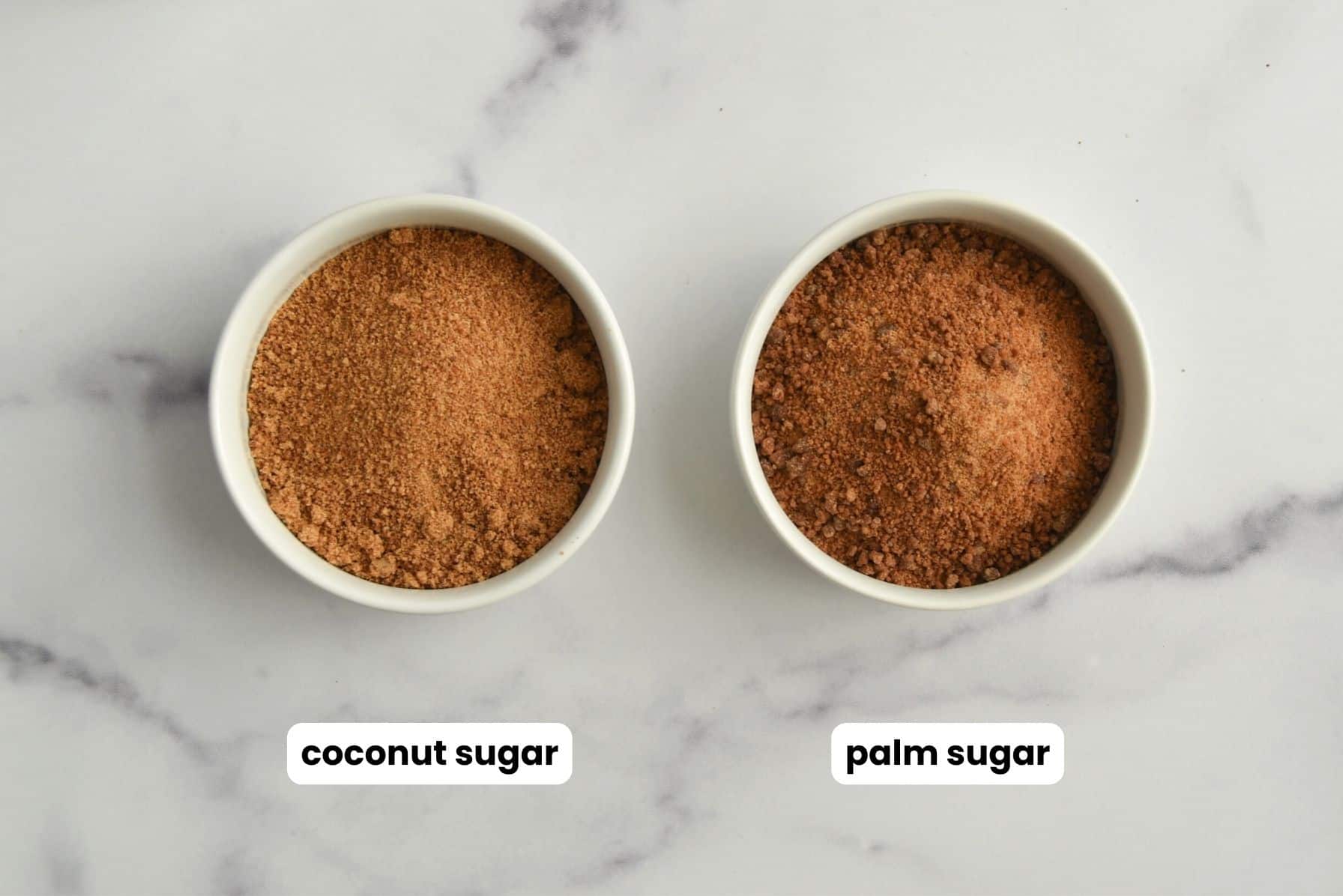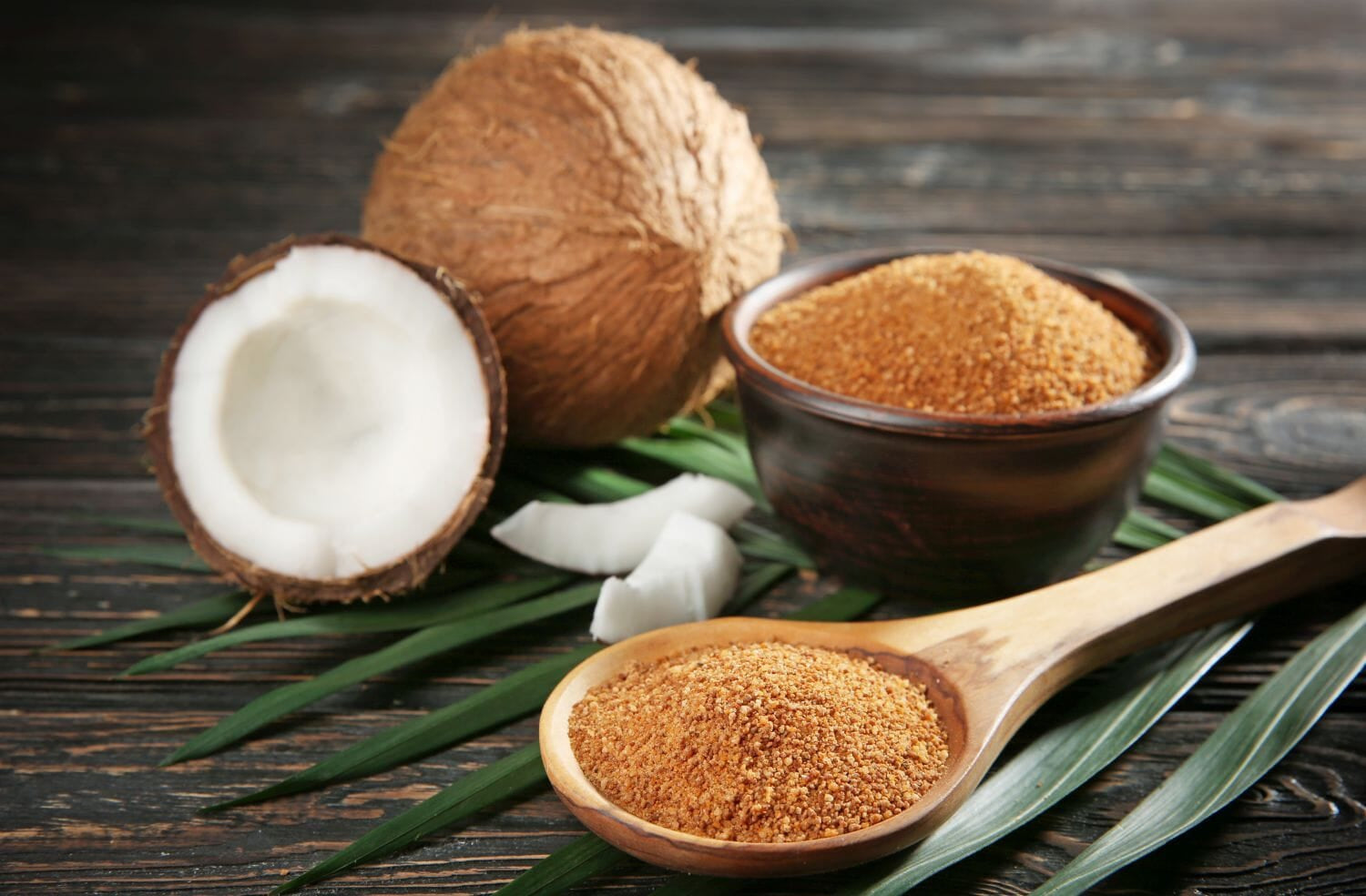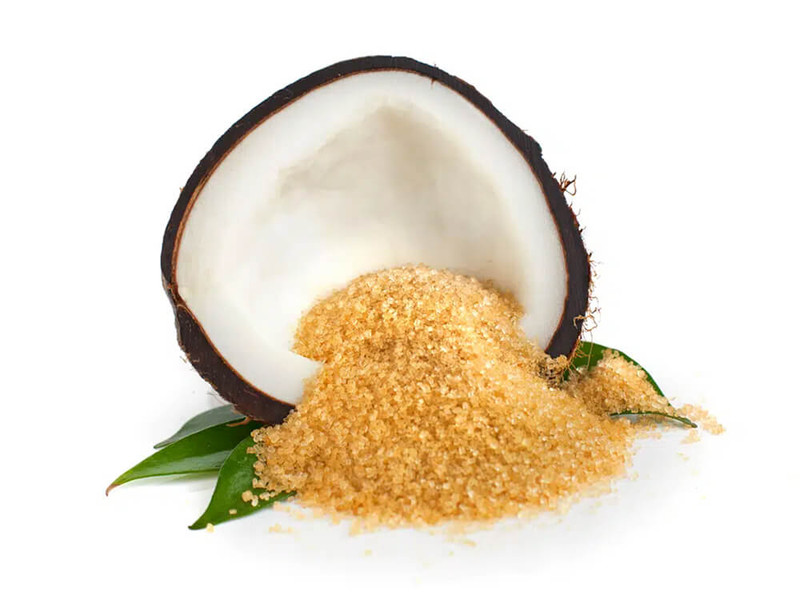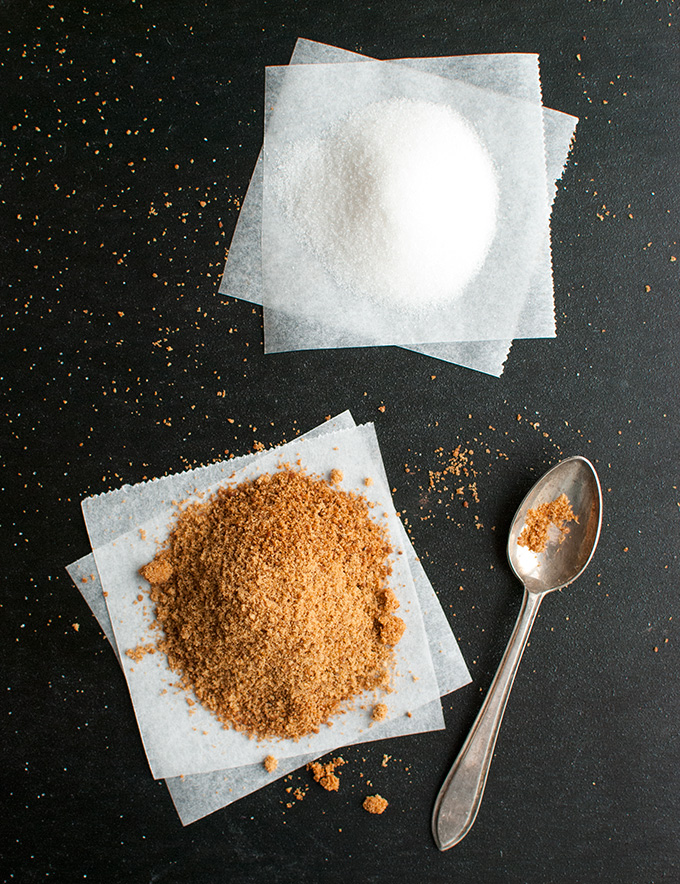What Is Coconut Sugar And Coconut Palm Sugar?

Coconut sugar and coconut palm sugar are two different types of sweeteners that are derived from the sap of coconut palm trees. Coconut sugar, also known as coconut palm sugar, is made from the sap of the coconut palm tree. It is a natural sweetener with a caramel-like flavor and is commonly used as a healthier alternative to refined sugar. On the other hand, palm sugar is made from the sap of various types of palm trees, excluding the coconut palm. While they share some similarities, it is important to distinguish between the two when selecting a sweetener for your cooking and baking needs.
Definition And Production Process Of Coconut Sugar
Coconut sugar, also known as coconut palm sugar, is a natural sweetener made from the sap of the coconut palm tree. The sap is extracted by cutting the flower bud of the tree and collecting the liquid that flows out. This liquid is then heated to evaporate the water content, leaving behind a thick syrup that solidifies into granulated sugar. Unlike refined sugar, coconut sugar retains some of the nutrients and minerals present in the sap, including potassium, iron, and zinc. Its production process involves minimal processing, making it a healthier alternative to traditional cane sugar.
Nutritional Content Of Coconut Palm Sugar
Coconut palm sugar, a natural sweetener derived from the sap of the coconut palm tree, boasts a decent nutritional profile. While it is still a form of sugar and should be consumed in moderation, it contains higher amounts of certain nutrients compared to regular table sugar. Coconut palm sugar is a good source of potassium, magnesium, iron, and zinc. It also contains traces of vitamins B1, B2, B3, and B6. Additionally, it contains small amounts of fiber and antioxidants, making it a slightly better option than refined sugar.
Coconut Sugar: Health Benefits And Uses

Coconut sugar, also known as coconut palm sugar, offers several health benefits. Unlike refined sugar, coconut sugar retains some of the nutrients present in the coconut palm sap. It contains higher amounts of potassium, magnesium, iron, and zinc compared to regular table sugar. Additionally, coconut sugar contains small amounts of vitamins B1, B2, B3, and B6. It also contains fiber and antioxidants. Due to its lower glycemic index, it provides a more stable energy source and helps prevent blood sugar spikes. Coconut sugar can be used as a substitute for regular sugar in various culinary applications, such as baking and cooking. It imparts a rich flavor profile and can enhance the taste of desserts, drinks, and savory dishes.
Benefits Of Using Coconut Sugar As A Sweetener
Coconut sugar offers several benefits when used as a sweetener. Firstly, it retains some of the nutrients present in the coconut palm sap, such as potassium, magnesium, iron, and zinc. Additionally, it contains small amounts of B-vitamins, fiber, and antioxidants. Coconut sugar also has a lower glycemic index compared to regular sugar, which means it provides a more stable energy source and helps prevent blood sugar spikes. Moreover, it imparts a rich flavor profile and can enhance the taste of desserts, drinks, and savory dishes.
Culinary Applications Of Coconut Sugar
Culinary applications of Coconut Sugar are vast and versatile. This sweetener can be used as a substitute for regular sugar in a wide range of recipes. It adds a unique caramel-like flavor to baked goods, such as cookies, cakes, and muffins. Coconut sugar is also commonly used in making sauces, dressings, and marinades, giving them a rich and slightly nutty taste. Moreover, it can be sprinkled on top of oatmeal, yogurt, or fruit for added sweetness. With its earthy profile, Coconut Sugar enhances the flavor of both sweet and savory dishes, making it a favorite among chefs and home cooks alike.
Coconut Palm Sugar: Health Benefits And Culinary Uses

Coconut Palm Sugar is not just a flavorful sweetener, but it also offers numerous health benefits. This natural sugar contains essential minerals like potassium, iron, and calcium, which are important for maintaining overall health. Additionally, it has a lower glycemic index compared to regular sugar, which means it is digested more slowly, preventing sudden spikes in blood sugar levels. In terms of culinary uses, Coconut Palm Sugar can be used as a direct substitute for regular sugar in baking and cooking. It adds a subtly sweet and caramel-like flavor, making it perfect for both sweet and savory dishes.
Health Advantages Of Coconut Palm Sugar Compared To Coconut Sugar
Coconut Palm Sugar offers several health advantages compared to Coconut Sugar. Firstly, it contains essential nutrients like potassium, iron, and calcium, which are beneficial for overall health. Additionally, Coconut Palm Sugar has a lower glycemic index than regular sugar, meaning it is digested more slowly and does not cause sudden spikes in blood sugar levels. This can be particularly beneficial for individuals with diabetes or those looking to manage their blood sugar levels. Lastly, Coconut Palm Sugar is also considered to have a lower fructose content compared to other sweeteners.
How Coconut Palm Sugar Is Used In Cooking And Baking
Coconut Palm Sugar is a versatile sweetener that can be used in a variety of cooking and baking recipes. Its deep, caramel-like flavor adds a rich and complex taste to dishes. In baking, it can be used as a one-to-one replacement for regular sugar, adding depth and sweetness to cakes, cookies, and muffins. It can also be used in sauces, marinades, and dressings to add a touch of sweetness and depth of flavor. Additionally, it can be dissolved in liquids to create syrups and caramel sauces. Its versatility makes it a popular choice for those looking to add natural sweetness to their culinary creations.
Flavor Profile And Glycemic Index

Both coconut sugar and coconut palm sugar have unique flavor profiles. Coconut sugar has a rich, caramel-like taste with a hint of butterscotch, adding depth and sweetness to baked goods and desserts. On the other hand, coconut palm sugar has a more mild and earthy flavor, similar to brown sugar. As for the glycemic index, coconut sugar has a slightly lower glycemic index compared to coconut palm sugar. This means that coconut sugar causes a slower rise in blood sugar levels compared to coconut palm sugar. However, both sugars should still be consumed in moderation, especially by those with diabetes or blood sugar concerns.
Taste Profile Of Coconut Sugar And Coconut Palm Sugar
Coconut sugar and coconut palm sugar have distinct flavor profiles that add depth and sweetness to a variety of dishes. Coconut sugar has a rich, caramel-like taste with hints of butterscotch, making it a popular choice for baked goods and desserts. On the other hand, coconut palm sugar has a more mild and earthy flavor, similar to brown sugar. The unique flavors of both sugars can enhance the taste of dishes and provide a unique twist to traditional recipes.
Comparison Of The Glycemic Index Of Both Sweeteners
The glycemic index is a measure of how quickly a particular food raises blood sugar levels. When comparing the glycemic index of coconut sugar and coconut palm sugar, both sweeteners have a relatively low glycemic index of 35. This means that they have a minimal impact on blood sugar levels compared to refined sugar, which typically has a glycemic index of 60-65. The lower glycemic index of coconut sugar and coconut palm sugar makes them a better option for individuals who are concerned about blood sugar control or have diabetes.
Environmental Impact And Sustainability

The production of both coconut sugar and coconut palm sugar has a lower environmental impact compared to traditional sugar production. To produce coconut sugar, coconut sap is collected from the flower buds of coconut trees, which does not require the destruction of the tree itself. Coconut palm sugar is derived from the sap of coconut palm flowers, which can be harvested without harming the tree. Additionally, coconut trees require less water and energy to grow compared to sugar cane or beet crops. This makes coconut sugar and coconut palm sugar a more sustainable option for those who are conscious of their environmental footprint.
Environmental Considerations Of Coconut Sugar And Coconut Palm Sugar Production
The production of both coconut sugar and coconut palm sugar has a lower environmental impact compared to traditional sugar production. To produce coconut sugar, coconut sap is collected from the flower buds of coconut trees, which does not require the destruction of the tree itself. Coconut palm sugar is derived from the sap of coconut palm flowers, which can be harvested without harming the tree. Additionally, coconut trees require less water and energy to grow compared to sugar cane or beet crops. This makes coconut sugar and coconut palm sugar a more sustainable option for those who are conscious of their environmental footprint.
Sustainability And Ethical Aspects Of Harvesting These Sweeteners
The harvesting of both coconut sugar and coconut palm sugar has sustainable and ethical considerations. Coconut trees are known for their high yield and longevity, requiring less water and energy to grow compared to sugar cane or beet crops. They also play a vital role in maintaining soil health and preventing erosion. Additionally, coconut sugar and coconut palm sugar production typically involves small-scale farming practices, providing opportunities for local communities and supporting sustainable livelihoods. By choosing these sweeteners, consumers can contribute to sustainable agriculture and support ethical practices in the sugar industry.
Conclusion

In conclusion, both coconut sugar and coconut palm sugar are viable alternatives to traditional refined sugars. However, when considering health benefits and sustainability, coconut sugar emerges as the preferred choice. It contains a lower glycemic index, making it suitable for individuals concerned about blood sugar control. Additionally, coconut sugar production supports sustainable farming practices and provides economic opportunities for local communities. With its unique flavor and nutritional value, coconut sugar is a versatile option for those seeking a healthier and more ethical sweetener. Make the switch to coconut sugar and embark on a journey towards a more sustainable and conscious lifestyle.
Summary Of The Key Differences Between Coconut Sugar And Coconut Palm Sugar
Coconut sugar and coconut palm sugar are both natural alternatives to refined sugar, but they do have some important differences.
Coconut sugar is derived from the sap of the coconut palm tree’s flower buds, while coconut palm sugar is made from the sap of the tree’s stem. This distinction affects the flavor and color of the two sugars, with coconut sugar having a stronger caramel taste and darker color compared to coconut palm sugar.
Another notable difference is the glycemic index. Coconut sugar has a lower glycemic index than coconut palm sugar, making it a better choice for individuals concerned about blood sugar control.
In terms of sustainability, both sugars come from the coconut palm tree, but the production of coconut sugar follows more ethical and environmentally friendly practices.
Overall, coconut sugar emerges as the preferred choice due to its unique flavor, lower glycemic index, and sustainable production methods.
Recommendations For Choosing A Sweetener Based On Individual Preferences And Dietary Needs
When it comes to choosing a sweetener based on individual preferences and dietary needs, there are a few factors to consider.
For individuals who are concerned about blood sugar control, coconut sugar with its lower glycemic index is a good option. It provides a sweet taste without causing a rapid spike in blood sugar levels.
However, for those who prefer a milder flavor and lighter color, coconut palm sugar may be a better choice.
Ultimately, it is important to experiment and find the sweetener that suits your taste preferences and aligns with your dietary goals. Additionally, moderation is key, as all sweeteners should be consumed in moderation as part of a balanced diet.
FAQ About Coconut Sugar Vs Coconut Palm Sugar: Sweetener Comparison
Q: What is the difference between coconut sugar and coconut palm sugar?
A: Coconut sugar and coconut palm sugar are actually the same thing and can be used interchangeably. Both are derived from the sap of the coconut palm tree.
Q: Are coconut sugar and coconut palm sugar healthy alternatives to white sugar?
A: Yes, both coconut sugar and coconut palm sugar are considered healthier alternatives to white sugar as they contain trace amounts of minerals and have a lower glycemic index.
Q: Do coconut sugar and coconut palm sugar taste the same?
A: Yes, both sugars have a similar taste profile with a caramel-like flavor, although some people may notice slight differences in taste depending on the brand or processing method.
Q: Can coconut sugar or coconut palm sugar be used as a 1:1 substitute for white sugar in recipes?
A: Yes, both coconut sugar and coconut palm sugar can generally be used as a 1:1 substitute for white sugar in most recipes, although the final taste and texture may vary slightly.
Q: Are coconut sugar and coconut palm sugar suitable for vegans and vegetarians?
A: Yes, both coconut sugar and coconut palm sugar are vegan and vegetarian-friendly sweeteners as they are plant-based and do not involve the use of animal products in their production.
Q: Are there any potential side effects or allergies associated with coconut sugar or coconut palm sugar?
A: While rare, some individuals may have allergies to coconut products. It is always advisable to consult a healthcare provider before incorporating new sweeteners into your diet, especially if you have known allergies.

Panda Cafe offers delicious dining and takeout to Fairfax, VA.
Panda Cafe is a cornerstone in the Fairfax community and has been recognized for its outstanding Chinese cuisine, excellent service, and friendly staff.